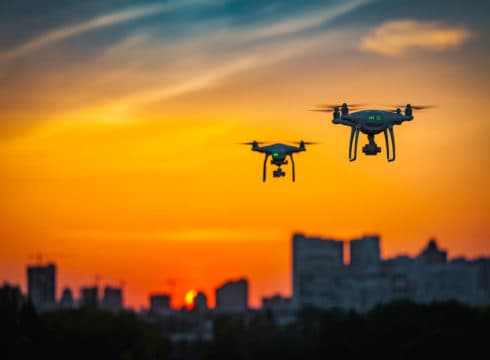Digital rights activists call mass surveillance as illegal
The foundation writes to the Director-General of Civil Aviation urging for quick action
India ranked third in the surveillance index, after Russia and China, says study
Inc42 Daily Brief
Stay Ahead With Daily News & Analysis on India’s Tech & Startup Economy
The usage of drones for surveillance by law enforcement authorities in Delhi during the Citizenship Amendment Act (CAA) protests has raised concerns about privacy. Digital rights activists are calling the act of mass surveillance as illegal.
The Internet Freedom Foundation (IFF), an Indian organisation which advocates for the protection of digital rights and liberties, has written to the office of the Director General of Civil Aviation urging for urgent action. “There has been a growing use of drones by policing departments across India. Quite often these are deployed across peaceful protests to record the movements of people and pose a risk to their privacy,” the IFF says in its website.
“They also may fly close to crowds threatening injury and causing anxiety. These concerns made us look more closely as to their legal framework and to our shock we discovered that these are completely illegal,” it added.
IFF has also written to the Delhi Police commissioner asking the Delhi Police to stop the use of facial recognition technology and video surveillance to identify protesters rallying against the legislation.
Quoting media reports, IFF says that the facial recognition system being used in Delhi is disturbing. “All of these clearly point to multiple illegalities and harms. From building an underlying database of people from public protests to running it on crowds of people attending rallies. This directly impairs the rights of ordinary Indians from the assembly, speech and political participation,” it says.
India Ranks Third In Surveillance
India ranked third in the surveillance index, after Russia and China, according to a study conducted by UK-based research firm Compritech. The score of 2.4 out of 5 on the privacy index indicates a systemic failure to maintain data privacy safeguards.
The survey ranked countries based on constitutional protections, statutory protection, privacy enforcement, biometrics, data sharing and the government’s access to data among other things.
“Several countries are creating what can only be described as surveillance states, with data privacy rights seemingly taking a serious back seat. Though European nations fare better due to the stringent General Data Protection Regulation (GDPR) laws, not one country is consistent in protecting the privacy of its citizens,” the survey, conducted across 47 countries, added.
The government has been pushing for the facial recognition system claiming it is helpful for the defence forces and the law and order authorities. The central government said in September this year that it will open bids to build a centralised facial recognition surveillance system across India.
The system will be linked up with a database of individual’s details ranging from passports to fingerprints. The new interface aims to help India’s police force identify criminals, missing people and dead bodies.
{{#name}}{{name}}{{/name}}{{^name}}-{{/name}}
{{#description}}{{description}}...{{/description}}{{^description}}-{{/description}}
Note: We at Inc42 take our ethics very seriously. More information about it can be found here.


